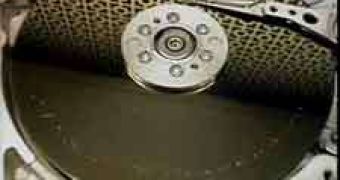Usually, hard disk drives are pretty silent hardware components. I mean, of course you can hear them, but the normal sounds they make are not too powerful and they appear under heavy workloads. Or so it is supposed to be, as there are some older drives that make a lot of noise when running at full capacity.
Sometimes, users may hear knocking or clicking sounds coming out from the hard disk drive in the form of a rhythmic sound that starts and stops at random time intervals. Most of the time the sound you hear is the first sign that your hard disk is getting old and it might quit on you rather sooner than latter. According to the site FAT-NTFS "this can happen when powering up your computer or working halfway on your computer" and as a precaution measure you should back up all your important data.
While there are several causes that lead to a "singing" hard disk drive, all of them of a mechanical nature, an electronic failure will usually fry the logic chips instantly, with no warning whatsoever. For users that have a SMART enabled disk and a mainboard that can read the disk's status, it is recommended to look for a warning either in the hard disk drive section of the BIOS or during the POST phase when booting up your machine. If the disk failure is imminent a warning may save all your data and prompt you to take the necessary steps. The singing problem is most often than not caused by the following: the existence of bad sectors on the data surfaces, head crash (Ouch!) and different mechanical faults.
Perhaps the most common cause of the singing hard drives consists in "bad sectors [which] are physical damage of a span of disk area". Because the disk cannot read the data stored in a certain area, the read and write heads will make several attempts to access the data, usually generating the clicking sound. "This can also occur when the head is unable to calibrate with the media servo tracks due to the gradual weakening of the magnetic domains on the platter that causes the drive to reset continuously". The easiest way to try and repair the bad sector problem is to perform a deep scan of the entire surface area that will mark all existing defective sectors, preventing the further loss of data when the operating system may decide to write a file just on a damaged sector.
If the sound you hear is more like a grinding sound than a nice clicking one, then I'm so sorry for your hard disk drive, as the heads just decided to scratch a little the data surfaces. This however, would be the worst case scenario, besides having the logic chips fried by an overvoltage, as the data can only be recovered in a specialized lab. Mechanical faults are quite common and they represent "a physical damage and these sounds can be caused by a malfunctioning spindle, Read Write head or loose components. Backup your data immediately if you are still able to access data on the disk. Your disk is near the end of its life and will stop functioning anytime. If your disk stops spinning after a period of clicking sound, you may wish to send your disk to a reputable data recovery firm to recover your data. More Information: Hard disk drive occasionally produces a spinning sound when it searches for a file which is heavily fragmented. This is caused by the spinning platters as the read-write heads zoom back and forth to access the different sectors where the data is stored. It is important to differentiate this spinning sound from the clicking sound. This spinning sound can be reduced by defragmenting your hard drive from time to time." (D'oh!)

 14 DAY TRIAL //
14 DAY TRIAL //